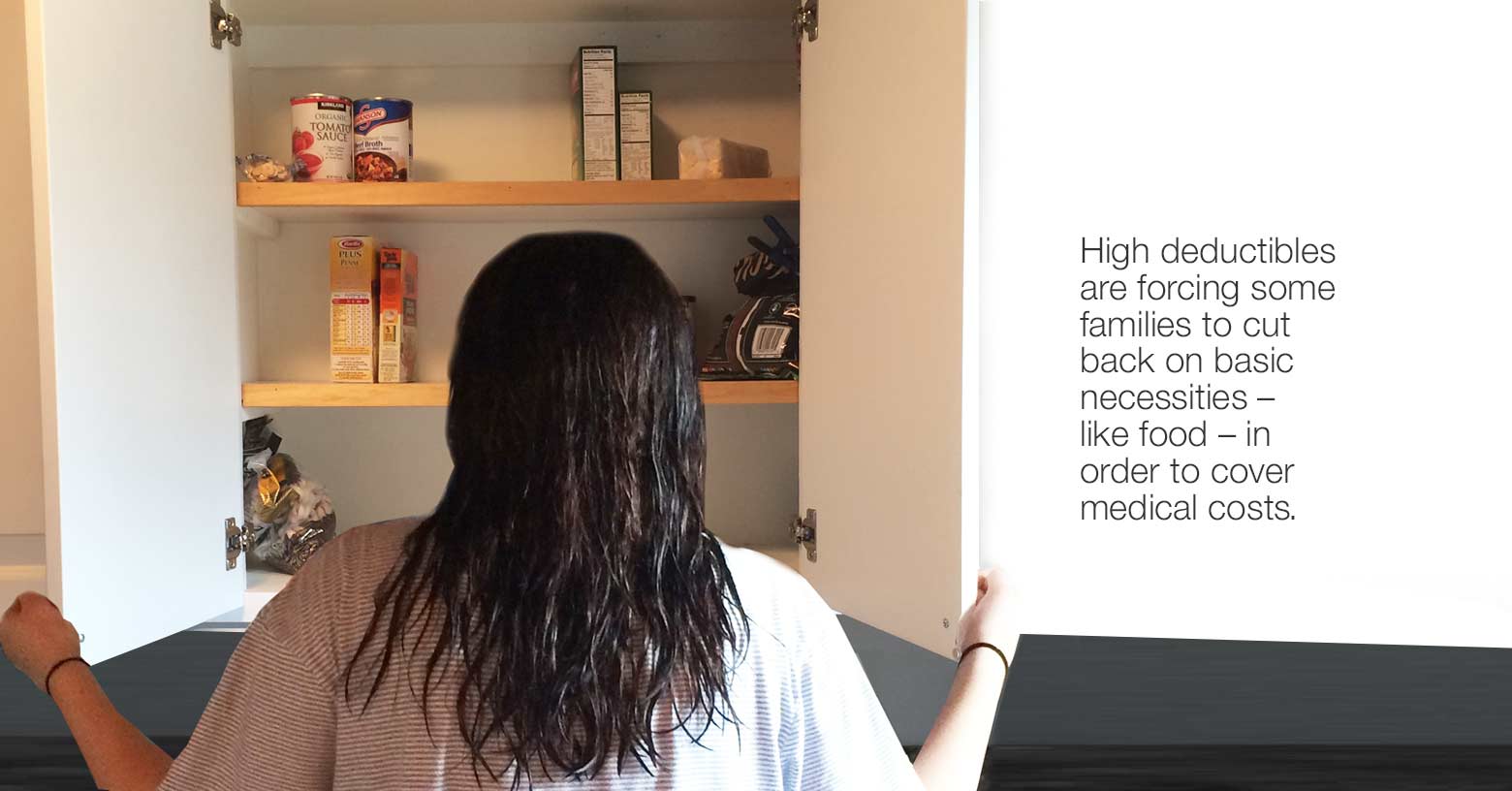
Recently, a number of reports have highlighted the problems many consumers face affording out-of-pocket costs for care, including close to a quarter of people with insurance. Here at Families USA, we have long been concerned that many consumers are still struggling to afford the cost of care, despite being insured.
We have been particularly concerned with the proliferation of high-deductible coverage. In 2015, close to half of workers with employer-sponsored coverage had deductibles of at least $1,000 for an individual. About the same proportion of people in marketplace coverage faced such high deductibles. This year, the average deductible for the most popular type of marketplace plans, Silver plans, comes in at over $3,000 for an individual.
Many families living to paycheck to paycheck have difficulty affording the cost of medications on their own, let alone covering thousands of dollars in medical care. For these households, high deductibles can hamper access to needed care. They can also jeopardize financial security and leave families vulnerable to medical debt.
The truth is that high deductibles don’t work for consumers or our health care system for a number of reasons.
High deductibles don’t make shoppers more savvy
Proponents of high deductibles often claim that deductibles make consumers more savvy health care consumers by encouraging them to shop for the best priced and most cost-effective care (such as lower-cost drug options or the best priced doctor). However, more and more research shows that this simply isn’t the case. In practice, high deductibles lead individuals to reduce their use of care across the board, including their use of important care they actually need.
Two recent studies measured the impact that switching to a high-deductible health plan had on consumers’ use of care. Both shed stark light on the negative consequences that these plans have when it comes to use of high-value care, like preventive services and services to manage chronic conditions.
One study looked at how people’s use of medications to treat or prevent diabetes, hypertension and cholesterol changed after their employer switched to a high-deductible plan. It found that while some people switched to less expensive generic versions of their medication, many people simply reduced their use of these medications altogether.Perhaps most telling, reduced utilization accounted for the majority of savings related to spending on these types of drugs. In the case of cholesterol and hypertension medications, at least 90 percent of savings tied to these drugs came from people reducing their use of these types of medications altogether.
A second study examined what happened when a large employer moved its employees from generous first-dollar coverage to a high-deductible health plan. It found that:
- Use of preventive care dropped by 10 percent;
- Use of services related to preventing complications or progression of diagnosed health conditions like diabetes dropped 12 percent;
- Overall, use of care dropped almost 18 percent. Reduced utilization was responsible for almost all savings the employer saw after switching to a high-deductible plan. There was no evidence that people shopped for care or switched to less expensive providers or procedures once in a high-deductible plan.
High deductibles handicap patients and providers
These findings highlight a huge shortcoming of high-deductible plans – they clash with driving greater value in our health care system. Many people can’t afford the full cost of even basic care and medications on their own. High-deductible plans make it very difficult or impossible for these patients to get timely care and follow the treatments their doctor prescribes. While this might save plans’ costs in the short term, it can lead to more expensive, preventable health care problems down the line.
Ultimately, high-deductibles handicap patients’ and providers’ ability to work together to effectively manage patients’ health, prevent disease and control any chronic conditions. This isn’t good for patients or our health care system. It is also increasingly problematic for providers, as more payers hold them financially accountable for improving care coordination and health outcomes, particularly for patients with chronic conditions. This is an incredibly challenging proposition if a provider’s patients simply can’t afford to follow their treatment recommendations. In order for providers to succeed in these new models, insurance will need to better support patients in accessing timely, appropriate care.
Many simply can’t afford high out-of-pocket costs
Beyond hampering access to care, high deductibles pose another very simple problem for many families: they are just unaffordable based on their income. Kaiser Family Foundation found that more than one in three households don’t have ready financial funds on any given day to cover a deductible of $1,200 ($2,400 for a family). Lower income families are much less likely to have the money to cover this size deductible – 68 percent don’t have ready funds to cover this cost.
Adding to this, a recent New York Times and Kaiser Family Foundation poll found that more than one in four people with high deductibles exceeding $1,500 ($3,000 for a family) had problems paying medical bills in the past year. For these families, paying the full cost of care up to a deductible is a strain that has led to other financial problems, like medical debt, or having to deplete savings or cut back on other basic necessities, like food, in order to cover medical costs.
Health insurance is meant to provide families with security that they will not go bankrupt or face financial hardship to care for themselves or loved ones. And the Affordable Care Act did establish important protections that ensure coverage protects families from catastrophically high medical costs. However, high deductibles continue to expose many lower- and middle-income families to costs that could harm their financial security and well-being.
Policymakers must act to improve affordability
Families USA thinks it’s critical that state and federal policymakers take action to help address the problems that deductibles pose. In the short-term, we need more insurance plans to exempt non-preventive services from the deductible, including outpatient care, medications, and services that are important to managing chronic conditions. The federal government and many state-based exchanges have already taken steps to spur insurers to adopt this type of insurance design within their individual marketplace:
- Earlier this year, CMS announced new federally designed standardized plans that insurers in federally facilitated marketplaces have the option to sell. These plans exempt numerous outpatient services and all medications from the deductible. In future years, we hope that the federal government will go further and require insurers to sell these plans.
- Seven state-based exchanges already have created their own standardized plans that insurers in their marketplace are required to sell. The majority of these exchanges have designed plans that exempt numerous outpatient services from their deductible.
Looking forward, we hope more state exchanges develop standardized plans or take other steps to require insurers in their marketplace to exempt outpatient services from plan deductibles.
State and federal lawmakers must develop long-term strategies to better shield families from unaffordable deductibles and other out-of-pocket costs relative to their income. This should include policies that strengthen financial assistance for health coverage so that families can afford more comprehensive coverage.
At the end of the day, we need to ensure that all families have coverage that provides them with the peace of mind that they will be able to truly afford the care their family needs.
Lydia Mitts is a Senior Policy Analyst at Families USA. She specializes in private insurance issues, including market reforms and financial assistance programs under the Affordable Care Act, wellness incentive programs, marketplace plan benefit design, and cost-sharing. She also specializes in health system improvement issues related to consumer incentives in plan design, as well as delivery and payment reform.

Get your free quote now through licensed agency partners!







